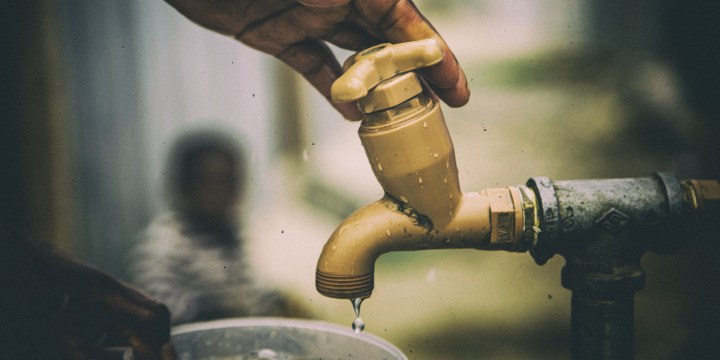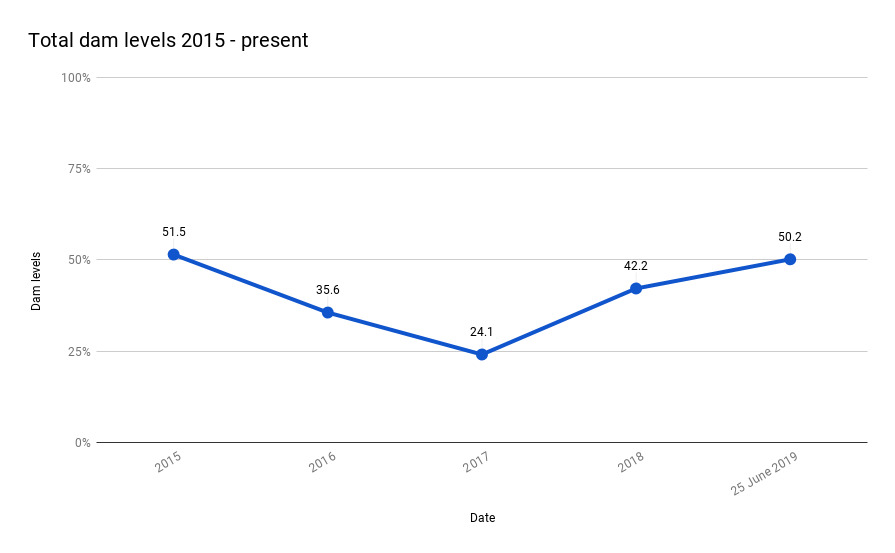CAPE WATER CRISIS
Dam levels are half full, but not yet time to ease up on saving measures

Water-starved Capetonians started the week on a positive note, with dam levels reaching a high of 50.2% on Monday and increasing to 50.9% on Tuesday. Despite uncertainty around rainfall and weather patterns, the City remains optimistic that dams will continue to rise.
During the week of 17-23 June, dam levels in the six major dams supplying the City of Cape Town increased by 1.5% overall, putting total supply at just over half. While this is not the first time dam levels have tipped over the halfway mark since the drought, it is a step in the right direction for city residents.
This time in 2018 the metro’s dams were at 42% capacity, with Level 6b water restrictions in place. Although the controversial Day Zero had already been pushed out to 2019, Cape Town residents were still only flushing when needed and showering every other day.
According to Dr Kevin Winter, senior lecturer at the University of Cape Town’s Future Water Institute, the current weather pattern and dam levels are similar to those of 2015, but water consumption has decreased significantly in the last four years.

“In 2015 we had level one water restrictions, but we were using about 1.2-million litres of water per day. Compare that to today, where we’re using just over 500,000 a day, we’re doing quite well,” Winter told Daily Maverick.
Overall, Cape Town residents can use a total of 650 million litres of water per day under level 3 water restrictions, which were implemented at the end of 2018. Even so, city residents are still saving water, and consistently use less than the City budgets for. Last week the metro’s overall water consumption dropped by 8-million litres a day, from 542 to 534 million litres.
Despite three of the six major dams that supply the city still hovering around 40% full, the increase in rainfall and decrease in water consumption over the last few weeks has had a significant impact on dam levels. According to Chairperson of the Water Resilience Advisory Committee, Councillor Xanthea Limberg, just three weeks ago dam levels were on the decline.
Based on 2015 data, Winter believes the next 6-8 weeks are crucial and will determine whether the City will have enough water for 2020. If, at the end of October, dam levels are somewhere near 70%, Winter anticipates a stable supply of water in 2020. But only if demand does not spike.
“We are on the cusp of demand and dam levels,” Winter told Daily Maverick. “If we continue with what we’re doing we’ll be absolutely fine.”
Although the City is optimistic that dam levels will continue to rise, Limberg admitted that predicting rainfall has become a difficult job. And although full capacity would be ideal, the City notes that total recovery is unlikely.
“We are operating in far more uncertain times than we were previously because of the erratic levels of rainfall and the climate variability.”
While debate over whether or not the City was under- or over-collecting water tariffs has spiked in recent months, Winter notes that a relaxing of water restrictions in order to increase revenue will have disastrous effects.
“The City doesn’t recover enough revenue to run the [water supply] system effectively, but the water restrictions model works, and it should be kept in place.”
Although Limber told Daily Maverick that the City does hope to relax water restrictions in the future, it is still committed to a cautious approach to managing dam levels.
Level 3 water restrictions were amended in March to allow for the irrigation of private gardens using municipal water.
The following key changes are most noteworthy:
Watering/irrigation with municipal drinking water is allowed only before 09:00 or after 18:00 for a maximum of one hour per day per property as follows:
- On Tuesdays, Thursdays and Saturdays using dripper, drip line or soaker hose irrigation or using a bucket or watering can;
- On Saturdays using sprinklers or a hosepipe fitted with a self-closing spray nozzle.
No watering/irrigation with municipal drinking water within 48 hours of rainfall that provides adequate saturation. DM
For a full list of the amended restrictions, click here. To get up-to-date dam level information, click here.



















 Become an Insider
Become an Insider